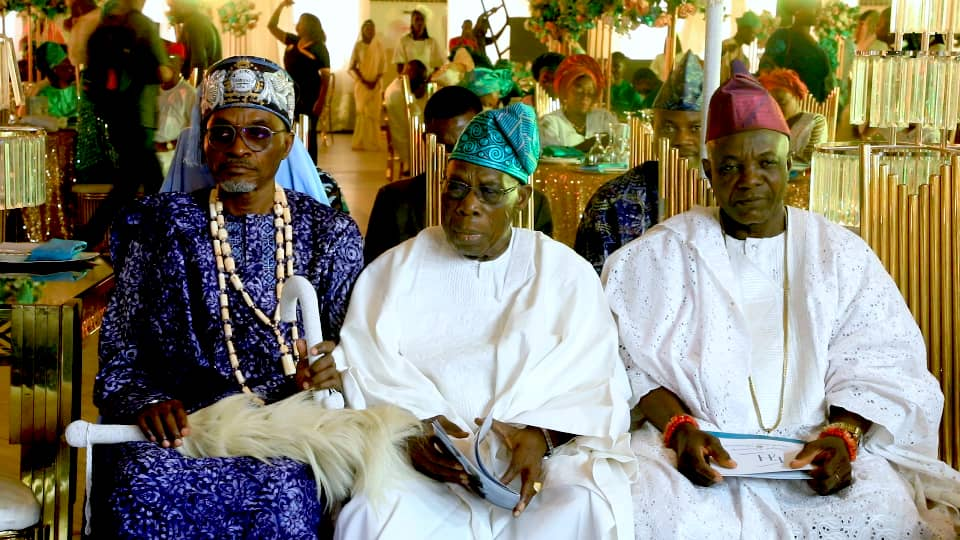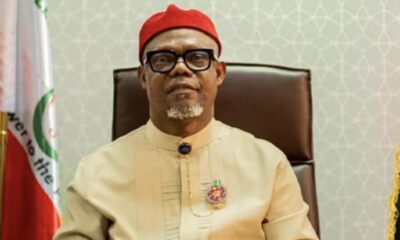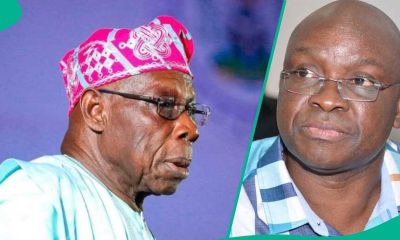Uncategorized
BettaGate: Can Tinubu bell the cat?

BettaGate: Can Tinubu bell the cat?
By Bola BOLAWOLE
turnpot@gmail.com 0807 552 5533
Will sleaze and controversy ever depart from these shores? Two of such making the rounds at the moment are the BBC documentary on the late Prophet Temitope Balogun (TB) Joshua of the Synagogue Church of All Nations (SCOAN) and the multi-billion Naira scandal involving two of President Bola Ahmed Tinubu’s ministers – the Minister of Humanitarian Affairs and Poverty Alleviation, Betta Edu, and the (before now?) top-flight Minister of Interior, Olubunmi Tunji-Ojo.
What is BBC’s interest in TB Joshua, especially since he is dead and is nearly forgotten? What public interest will the BBC documentary serve? Is there any way anyone who has suffered as a result of the activities of TB Joshua will receive justice or have their situation and or circumstance ameliorated? Will justice be served to anyone who has suffered injustice as a result of the activities of the prophet and can his estate be held liable, if only for compensation purposes?
Assuming we have here a Truth and Reconciliation commission, like President Nelson Mandela instituted in South Africa in 1995 through the Promotion of National Unity and Reconciliation Act 34 of 1995 after the collapse of apartheid and the enthronement of black majority rule, we can then say that the catharsis occasioned by the recalling of injustices suffered, confessions and pleas for forgiveness made, reconciliation followed by compensation, where possible – we can say all of this could help the healing process as it calms frayed nerves and bows the head of culprits.
The Human Rights Violation Investigation Commission of Nigeria, which imitated its South African counterpart, was inaugurated by the President Olusegun Obasanjo administration in 1999. Otherwise known as the Oputa panel, so named after its chairman, Justice Chukwudifu Oputa, its mandate was to investigate human rights abuses during the period of military rule from 1984 to 1999. It failed abysmally because the key violators of human rights during the period under review, Gen. Muhammadu Buhari, Gen. Ibrahim Babangida, and Gen. Abdulsalami Abubakar (with Gen. Sani Abacha already dead) not only boycotted it but poured scorn on it. With Obasanjo cleverly leaving out his own tenure of office as military Head of State (1976 – 1979), his hands were tied, so to say, as he could not compel his military subordinates to turn up before Oputa. With the big fishes out of the way, what was left was just a circus show and waste of scarce public resources.
Snippets of the BBC documentary on TB Joshua are already in the public domain. Some of the “revelations” were common knowledge to insiders in those days and, therefore, were no secret to me. I attended Synagogue for close to two years and had near unrestrained access to TB Joshua as I was the editor of the church magazine and a very close pal of his second-in-command then, Prophet Taiye Oladosu (Prophet T, as we called him). I also nearly married one of the choristers there, Sister Esther (where is she now?).
TB Joshua called me “Uncle” and I called him “Pastor”. Church, to me, is: What you seek is what you get! And this does not pertain only to Synagogue or TB Joshua; neither does it exonerate TB Joshua or Synagogue from answering to whatever charge that may be laid at their door-mouth. But those who died, those whose lives were ruined, and those whose destinies were truncated – how do we know them; and how do we get them justice? Will the BBC documentary move our government to action in any way? But if it helps to sound an alarm to the millions of worshippers still under the influence of the many TB Joshuas still in our midst and the many Synagogues still taking advantage of the gullible, then, it would have served a purpose. So much for TB Joshua!
Two ministers in the seven-month-old Asiwaju Bola Ahmed Tinubu administration are enmeshed in the billion-Naira “poor-people-money” scandal making the rounds. It is money meant for the poor, to alleviate their suffering, that people are alleged to be doing monkey business with. Some people can be heartless! Their conscience is seared, if at all they still have any. Now, the Minister responsible has been suspended from her post and an investigation ordered.
One thing I like about the Tinubu administration, and I will keep saying it, is that this President listens to public opinion. He acts on public outcry, very much unlike his predecessor who played deaf and dumb. We await the outcome of the EFCC investigation, which must be swift and thorough, and which must be made public. If this Minister is found culpable, she has to face the music.
Does it suggest anything that the two Tinubu ministers that have been involved in scandals so far are women? The first was the Minister for Women Affairs, Uju Kennedy-Ohanenye. If we can laugh off her idiocy as she threatened to sue the United Nations over the (mis)management of donor funds to Nigeria, we cannot do likewise over her threats to, and blackmail of, university students calling out the Dean of their Faculty as sex predator. The minister has since apologized, though, and the lecturer in question is having his day in court. A Federal High Court in Abuja has ordered him remanded in Kuje prisons.
The doors of the Presidential Villa may have been slammed against her but it is not likely that Betta Edu is intent on going away quietly. She may drag a lot of people along with her. Unfortunately, the high-performing Minister of Interior, Olubunmi Tunji-Ojo, has had his company named as having benefited from what looks like a repeat of the arms bazaar that consumed NSA Sambo Dasuki and many others in the PDP/President Goodluck Jonathan administration.
I listened to Tunji-Ojo as he tried to defend himself and I felt sorry for him. Yes, he started the company in question with his wife. Yes, he was a director of the company for years but he resigned his position some years back. Yes, that is as much as the law required him to do as a public officer. Yes, the company is a legal entity that is at liberty to pursue its legitimate interests. Yes, the company can pursue, win, and execute contracts and should be held accountable for its actions. All legalese! But involved here are moral issues!
In 1 Corinthians 10:23. The apostle Paul said: “All things are lawful for me, but all things are not expedient: all things are lawful for me, but all things edify not” Tunji-Ojo may have fulfilled the provisions of the law by resigning as a director of the company but he still remains a shareholder and beneficiary of both the losses and gains of the company. Would he want the company to make a loss and liquidate while he is serving as minister or that it makes profit and prospers so he can return to a boisterous company? Is his wife still on the Board of the company or a shareholder? Can he vow that he never discusses the fortunes or misfortunes of the company? Could his influence or current position not have helped the company in this instance and or in some others? He may escape by the whiskers but what does the principle of strict liability say in this respect?
Now, the Ministry of Humanitarian Affairs and Poverty Alleviation is a cesspit of corruption: Scrap it! It was so in the time of Buhari. The ex-Minister in charge of the ministry under Buhari has started answering questions at the EFCC. Throwing money at problems does not solve the problems. Buhari did; he failed. It is unfortunate that Tinubu has continued in Buhari’s steps in this regard. It may be that he is being railroaded by his party leaders. Except he backtracks, he, too, is destined to fail.
The so-called palliative measures of Buhari palliated nothing but only fueled humongous corruption. In like manner, the Tinubu government’s palliative measures palliate nothing but has started providing opportunities for corruption. Rather than give people fish to eat, teach them how to fish. The funds being wasted on phantom poverty alleviation programmes should be deployed to more useful ventures.
Many are asking: Can this President fight corruption? He can! It is a matter of choice! It is difficult for a ruling party to throw caution to the wind as many would have loved but I dare to say that Tinubu has taken a few cautious steps in the right direction. But we must understand that he is part of the system and not an angel from above. He is a beneficiary of the system. He appears intent on keeping the system going. He seems to believe that the system can still be rescued, panel-beaten and restored to good health. I think he is wrong.
So, he may stem corruption, but can he uproot it? A leader is as good – and as bad – as the people he surrounds himself with. Look at the people around President Tinubu and form your opinion. The apple never falls far from the tree! Usually, the twin enemies are selfish interest and class interest. Is Tinubu prepared to scale both hurdles?
* Former Editor of PUNCH newspapers, Chairman of its Editorial Board and Deputy Editor-in-chief, BOLAWOLE was also the Managing Director/ Editor-in-chief of THE WESTERNER newsmagazine. He writes the ON THE LORD’S DAY column in the Sunday Tribune and TREASURES column in New Telegraph newspaper on Wednesdays. He is also a public affairs analyst on radio and television.
Uncategorized
Abeokuta shuts down as dignitaries gather for wedding of Yemi Kolapo’s daughter

Abeokuta shuts down as dignitaries gather for wedding of Yemi Kolapo’s daughter
Obasanjo, Emir Sanusi, Top Generals, Politicians, Media Icons, Nollywood Stars Grace Grand Celebration

The ancient city of Abeokuta stood still on Saturday, August 23, 2025, as a constellation of Nigeria’s most influential figures converged for the Nikkah (wedding) of Faizah Omoteniola Kolapo, daughter of Dr. Yemi Kolapo, Publisher of The Point Newspaper and Iya Sunnah of Egbaland, and AbdulHakeem Jimoh, son of retired military officer, Brig. Gen. Olanrewaju Jimoh.
A celebration of love and legacy

The beautifully adorned marquee of the Olusegun Obasanjo Presidential Library served as the venue for the grand affair. The event attracted guests from across the country and beyond, paying tribute to the philanthropic legacies of both families, according to a report by Freedomonline.
Dr. Kolapo, who is also President of the Media Transformation and Empowerment Foundation and Ameerah General of Ogun State, received high praise for her impact in media and religious spheres.
The groom’s father, Brig. Gen. Jimoh (rtd), was equally celebrated for his years of service and contributions to the society.
Sanusi, Obasanjo, Amosun lead distinguished guests

Among the most prominent guests was His Royal Highness Muhammadu Sanusi II, Emir of Kano and ex-Governor of the Central Bank of Nigeria. Despite last-minute travel changes due to the burial of the Emir of Zuru, Sanusi ensured his presence, describing it as a personal duty to honour Dr. Kolapo.

Other notable figures in attendance are:
- Former President Olusegun Obasanjo and his wife, Chief (Mrs) Bola Obasanjo
- Senator Ibikunle Amosun, former Governor of Ogun State
- Aremo Olusegun Osoba, veteran journalist and former Ogun State Governor
- Oba (Prof.) Saka Matemilola, the Olowu of Owu Kingdom
- Ambassador Sarafa Isola, former Nigerian High Commissioner to the UK
- Capt. Raji Rasheed (rtd), former Military Administrator of Sokoto State and Baba Adinni of Egbaland
- Otunba Oyewole Fasawe, businessman and political associate of Obasanjo
Governors, senators and political stalwarts present
Kogi State Governor Alhaji Usman Ododo, who lost his father just two days prior, was represented by the state’s Commissioner for Finance, Asiwaju Asiru Idris, alongside a team of special advisers.
Other political dignitaries included:
- Senator Shuaib Salisu (Ogun Central)
- Senator Lekan Mustapha, Aare Musulumi of Ogun State
- Senator Adesoji Akanbi, Okanlomo of Ibadaland
- Hon. Ladi Adebutu, PDP chieftain
- Hon. Segun Showunmi, Convener of The Alternative
- Alhaja Salmot Badru, former Ogun Deputy Governor
- Rt. Hon. Suraj Adekunbi, two-term Speaker, Ogun Assembly
- Prof. Anthony Kila, Pro-Chancellor, Michael & Cecilia Ibru University
- Chief Ralphs Nwosu, Founding Chairman, African Democratic Congress
Strong media presence
The Nigerian media industry showed up in full force. Attendees included:
- Mr. Ademola Osinubi and Mr. Joseph Adeyeye, former and current MDs of Punch Newspapers
- Mr. Gbemiga Ogunleye, ex-Provost, NIJ
- Chief Raheem Adedoyin, Secretary-General, International Press Institute
- Mrs. Funke Egbemode, ex-Osun Information Commissioner and past NGE President
- Mr. Mustapha Isah, former NGE President
- Mr. Femi Adesina, ex-presidential spokesman
- Dr. Reuben Abati, media personality and former presidential aide
- Mr. Tunde Rahman, SSA on Media to President Tinubu
- Mr. Eze Anaba, current NGE President
- Chief Chris Isiguzo, NUJ leader
- Dr. Kabir Garba, NGE Vice President
- Dr. Lasisi Olagunju, Saturday Tribune Editor
Corporate communications heads from top banks and firms also attended, including:
- Nasir Ramon (UBA)
- Kunle Aderinokun (Access Bank)
- Tajudeen Ahmed (BUA Industries)
Clerics and Islamic scholars deliver powerful messages
The spiritual aspect of the Nikkah was led by top Islamic scholars, including:
- Sheikh Saadallah Bamgbola, Chief Imam of Egbaland
- Sheikh AbdulQuadr Junaid, Chief Imam of Remoland
Prof. Kamaldeen Balogun, Chief Imam of Gbagura and wedding lecturer
- Sheikh Sulaimon Farouk Onikijipa, Grand Mufti of Ilorin
- Sheikh Sulaiman AbdulAzeez, Imam Gambary of Ilorin
Prof. Balogun emphasized loyalty, patience, and mutual support in his sermon. The Emir of Kano also offered heartfelt advice: “In everything you do in marriage, ask yourself — is this something you would do to someone you truly love?”
Military brass and public service titans in attendance
Serving and retired top brass of the military added weight to the guest list. These included:
- Maj. Gen. RO Yusuff (rtd)
- Maj. Gen. JB Olawumi (rtd)
- Maj. Gen. Oyefesobi (rtd)
- Maj. Gen. Ajetunmobi, Maj. Gen. Ogunlade, AVM Demola Durotoye (rtd)
- Maj. Gen. Faruk Mijinyawa, GOC 81 Division Lagos
- Rear Admirals Imam and Olanrewaju
- Brig. Gen. GU Nwamba, Commander, 35 Arty Brigade, Alamala
- Maj. Gen. BO Sawyerr, among others
Star Power: Nollywood graces the occasion
The wedding also sparkled with the presence of Nollywood royalty:
- Chief Adebayo Salami (Oga Bello)
- Fathia Balogun, Bimbo Akintola, Toyin Abraham and husband
- Fausat Balogun (Madam Saje)
- Doyin Kukoyi, media influencer Queen Zara Onyinye, and others
Emotional moments and speeches
The groom’s father, Brig. Gen. Jimoh (rtd), expressed deep gratitude to God and to all guests.
Dr. Yemi Kolapo said with pride: “I feel super proud that I raised a lovely daughter. My message to them is to live in peace, shut out intruders, love each other, and grow together.”
Senator Amosun described the union as “blissful” and prayed for future generations to celebrate similarly joyous occasions.
Reception Chairman, Amb. Sarafa Tunji Ishola, delivered a thought-provoking speech, likening marriage to a journey from “the ocean of fantasy to the ocean of reality.” He stressed mutual respect, responsibility, and non-violence in marital life.
A musical finish by K1 De Ultimate
The reception climaxed with a thrilling performance by Fuji legend Alhaji Wasiu Ayinde Marshal (K1 De Ultimate), who kept the crowd entertained with his evergreen hits.
The wedding of Faizah and AbdulHakeem was more than a ceremony—it was a convergence of tradition, prominence, and goodwill, reflecting the strong reputations of both families. Abeokuta may not witness such a high-powered gathering again soon, but the memories of August 23, 2025, will live on.
Uncategorized
Israel steps up bombardment of Gaza City killing 16 people

Israel steps up bombardment of Gaza City killing 16 people
CAIRO: Israeli forces killed at least 16 Palestinians across Gaza on Thursday and wounded dozens in the south of the enclave, local health officials said, as residents reported intensified military bombardment in the suburbs of Gaza City.
The military is preparing to take Gaza City, the enclave’s largest urban center, despite international calls on Israel to reconsider this over fears that the operation would cause significant casualties and displace the roughly one million Palestinians sheltering there.
In Gaza City, residents said families were fleeing their homes, with most heading toward the coast, as Israel forces bombarded the eastern suburbs of Shejaia, Zeitoun, and Sabra. Thursday’s deaths took to 71 the number of Palestinians killed by Israeli fire in the past 24 hours, the health ministry said.
Israel officials describe Gaza City as the last stronghold of Hamas, which ignited the war with its deadly October 2023 attack on Israel. The Islamist militant group has since been decimated by Israel’s assault on Gaza.
The Israeli military said in a statement that it was continuing to operate throughout Gaza targeting what it described as “terrorist organizations” and infrastructure.
READ ALSO:
- Bauchi governor confirms PDP considering Jonathan, Obi for presidential ticket
- Breaking: Fernabahce sack Mourinho after missing out on Champions League
- Hotels must obtain licence to use musical works – Court rules
The military had killed three militants in the past day, it said, without saying how they had identified the individuals.
A spokesperson for the International Committee of the Red Cross told Reuters that 31 “weapon-wounded” patients, most with gunshot wounds, were admitted to the Red Cross Field Hospital in the southern Gaza town of Rafah. Four of them were declared dead on arrival.
“Patients said they were injured while trying to reach food distribution sites,” the spokesperson said, adding that since the food distribution sites began operations on May 27, the hospital had treated over 5,000 “weapon-wounded patients.”
Dozens of Palestinians were admitted to Nasser Hospital in nearby Khan Younis with gunshot wounds, according to a doctor there who said the military had opened fire on a crowd of Palestinians that had gathered near an aid distribution site.
Mohammad Saqer, the head of nursing, told Reuters most of the patients had been admitted with gunshot wounds to the upper parts of the body and that many were in critical condition.
The patients had reported they were shot as they sought to collect food from a distribution site in Rafah, he said.
The Israeli military had no immediate comment.
The war broke out when Hamas-led militants launched a surprise, cross-border attack on Israel on October 7, 2023, killing around 1,200 people and taking another 251 hostage. Most of the hostages have since been released through diplomatic negotiations, though 50 remain, of whom 20 are said to be alive.
Israel has not responded publicly to Hamas’ acceptance of a proposal for a ceasefire that would allow for the return of some of the hostages. Israeli officials have, however, insisted that it would only accept a deal that sees all of the hostages released and Hamas’ surrender.
Israel’s military campaign, which it says is directed toward Gaza’s rulers Hamas, has devastated the territory and displaced most of the roughly two million Palestinians there.
More than 62,000 Palestinians, most of them women and children, have been killed by the Israeli military, according to local health officials, who have not said how many combatants have been killed in the fighting.
With the enclave in the grips of a humanitarian crisis, the Gaza health ministry said on Thursday that four more people, including two children, had died of malnutrition and starvation in the enclave, raising deaths from such causes to 317 people, including 121 children, since the war started.
Israel disputes the health ministry’s fatality figures and on Wednesday asked a global hunger monitor to retract an assessment that found that Gaza City and surrounding areas are suffering from famine.
Israel steps up bombardment of Gaza City killing 16 people
ARAB NEWS
Sports
Arsenal record slim victory over Manchester United at Old Trafford

Arsenal record slim victory over Manchester United at Old Trafford
Arsenal on Sunday opened their 2025-26 Premier League campaign with a hard-fought 1-0 victory over Manchester United at Old Trafford.
Riccardo Calafiori scored the only goal after the Italian defender pounced on a huge mistake by United’s stand-in goalkeeper Altay Bayindir.
Manchester United fought hard to find their way back but they were unable to find the breakthrough.
The Gunners held on to grab the maximum points to begin their season on a victorious note.
Arsenal coach, Mikel Arteta, described the victory as a great result, praising the players for their hunger in the encounter.
He said, “A great result. In the first game of the season you come to Old Trafford. You sense the momentum that they’re trying to build with the ambition they have with the club.
“We have the hunger, desire and ability to win. I am really pleased with that.
“Last year we drew here and we probably played better.
“We came here away and won, which is a big result. We were clearly not at our best. We attacked the box and we reacted well to unusual mistakes. The team reacted time after time in an incredible way. Very proud of that because that is why we got the opportunity to win the game.
“We showed resilience and a will to win. They put you on the ropes here, you will have to have moments when you suffer. To find a way to win at this ground, I’m very happy with the team.
Arteta was delighted with the new signings’ impact after the likes of Viktor Gyokeres, Noni Madueke, and Martin Zubimendi made their debut for the club.
“They have made good impact on the team; they have a great attitude. Physically some of them are still not at the level we require for 95 minutes but we will get there.”
Similarly, Manchester United manager, Ruben Amorim, was proud of his team’s performance despite the defeat.
He said: “It was really hard because I think we showed that we were the better team today. We played better than Arsenal.
“A strange goal, but then we tried everything to score a goal. We have small things that will make a difference in the future. The defence felt like a different team and that is a good thing, but we need to win games.
“I am proud of the players. I said so many times that the players need to adapt.
“Intensity, the way they are sprinting. They fought for every duel. They were so brave playing one against one. They were really brave, and I am happy with that.
The Portuguese coach has called for improvement ahead of their next Premier League game against Fulham next Sunday.
Amorim said: “We deserved more and we were the better team, that is clear but in the end we lost.
“We need to work on the things we need to improve. We need to defend set pieces. We did a lot of things right. There are a lot of things without seeing the video that we need to work on. I am really proud of my players.”
Arsenal will return to Premier League action against Leeds United on Saturday while Manchester United will take on Fulham on Sunday.
Arsenal record slim victory over Manchester United at Old Trafford
-

 Politics1 day ago
Politics1 day agoPeter Obi Launches ‘Village Boys Movement’ to Rival Tinubu’s City Boys Ahead of 2027
-

 International2 days ago
International2 days agoCanada Opens New Express Entry Draw for Nigerian Workers, Others
-

 News2 days ago
News2 days agoPolice to Arrest TikToker Mirabel After She Recants False Rape Claim
-

 International2 days ago
International2 days agoEpstein, Ex-Israeli PM Named in Alleged Profiteering From Boko Haram Crisis
-

 metro2 days ago
metro2 days agoOsun Awards 55.6km Iwo–Osogbo–Ibadan Road Project to Three Contractors
-

 Politics2 days ago
Politics2 days agoUpdated: Rivers Senator Mpigi Barinada dies at 64
-

 metro2 days ago
metro2 days agoOndo Monarch Killed as Bandits Strike Akure North
-

 Education1 day ago
Education1 day agoOgun Gov Rewards Nigeria’s Best Primary School Teacher with Car, Bungalow











